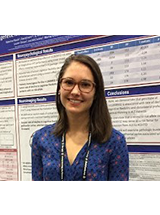Celebrating NGG Graduates
Please join us in our celebration as we highlight our NGG graduates.
The profiles are sectioned by degree type:
Doctor of Philosophy

Julia (Kate) Brynildsen
Mentor: Julie Blendy, PhD
Thesis Title: Modeling Genetic, Neural and Behavioral Correlates of Substance Use Disorders in Mice
Research and Lab Description: My thesis research employed systems-level approaches and molecular techniques to investigate the neurobiology of substance use disorders. Research in the Blendy Lab broadly focuses on understanding the neurobiological substrates of addiction and depression, and during my time in the lab I was fortunate to pursue diverse and collaborative projects amongst a highly supportive group of scientists.
Post PhD Plans: Postdoctoral training with Dr. Danielle Bassett at Penn.
Mentor Comment: Kate was one of the hardest working, dedicated and intellectually curious graduate students I have had the pleasure of mentoring. Throughout her time in the lab, Kate not only produced a substantial body of work that was to become her thesis, but contributed to many of her lab mate’s projects with enthusiasm. Kate has the agility, dedication and enthusiasm for science that not only contributed to her achievements as a graduate student but will benefit her along the way to becoming a great scientist.

Analise Gruenewald
Mentor: Dennis Kolson, MD, PhD
Graduate Training in Medical Science (GTMS) Certificate
Thesis Title: Analysis of the Role for Antioxidant Enzyme Heme OXYGENASE-1 in Brain Regional HIV Neuropathogenesis and Blood Brain Barrier Function
Research and Lab Description: My work interrogated the role of antioxidant heme oxygenase-1 in blood-brain barrier function in the pathogenesis of HIV-associated neurocognitive disorders. The Kolson lab investigates the neuroinflammatory mechanisms of HIV-associated neurocognitive disorders using cell culture and ex vivo analysis of human and simian brain tissue.
Post PhD Plans: I have been working as a medical writer for Cello Health Communications since July 2020.
Mentor Comment: Analise is a true believer in translating scientific knowledge into improving well-being, not only for individuals with medical needs, but also for society in general. Her training and experiences in research will lead her into a very successful future.

Ari Kahn
Mentor: Danielle Bassett, PhD
Thesis Title: Behavioral and Neural Correlates of Graph Learning
Research and Lab Description: I studied how humans learn models of statistical patterns in their environment and form mental representations of these regularities, through a combination of network science, human behavior, and neuroimaging. My thesis was under the supervision of Dr. Danielle Bassett, whose lab takes a multidisciplinary approach to studying complex systems, with a particular focus on applications of network science understanding whole-brain structure and function.
Post PhD Plans: In September 2020, I began as a postdoctoral research associate with Dr. Nathaniel Daw at the Princeton Neuroscience Institute. At Princeton, I will be expanding my research to Reinforcement Learning, investigating how the brain utilizes environmental statistics to arbitrate between multiple modes of decision making.
Mentor Comment: Ari E. Kahn graduated from Penn with two first-author papers, one in Nature Human Behavior and one in Cerebral Cortex. He was also a co-author on an additional 17 papers published in a range of disciplinary journals including Nature Physics, Nature Communications, Nature Biomedical Engineering, Journal of Neural Engineering, and Current Biology. His research focused on statistical learning in humans, where he sought to answer the question of how humans build models of their networked world.

Carolyn Keating
Mentor: Kacy Cullen, PhD
Thesis Title: Characterizing and Manipulating Neuronal Plasma Membrane Mechanoporation in Traumatic Brain Injury
Research and Lab Description: Carolyn examined neuronal plasma membrane poration in regions that control eye movements after traumatic brain injury, and also investigated whether diets that manipulate the composition of the plasma membrane could be used to alter susceptibility to this damage. Her lab, run by Dr Kacy Cullen, brings together bioengineering and neuroscience to study neurotrauma and develop technology to aid in repair.
Post PhD Plans: Carolyn is currently a Medical Writer at PRECISIONscientia where she uses her science communication skills to help improve the lives of patients.
Mentor Comment: After receiving a Bachelor’s degree in Neuroscience from Colgate University, Carolyn was an Intramural Research Training Award Fellow at the Eunice Kennedy Shriver National Institute for Child Health and Human Development at the National Institutes of Health. She then matriculated in Penn’s Neuroscience doctoral program, where her work focused on understanding the role of plasma membrane damage in neurons as a primary injury mechanism in traumatic brain injury (TBI). During her PhD work, Carolyn authored three first-author papers. First, she demonstrated the vulnerability of neurons in brain regions that control oculomotor function following repeat TBI, potentially providing a mechanism to explain this important symptomology of concussion (Keating et al., J Neurotrauma 2020). Next, her work showed that a diet rich in polyunsaturated fatty acids can alter vulnerability of brain neurons to plasma membrane permeability in TBI (Keating et al., Experimental Neurology 2021). Also, Carolyn co-authored a thorough and insightful review article detailing the role of mechanosensation signaling in TBI pathology (Keating & Cullen, Neurobiology of Disease 2020). Carolyn has also contributed to 4 other papers in lab and is a co-inventor of a pending patent based on her important contributions to preventing and treating TBI. It has been an absolute pleasure to mentor Carolyn, who was always positive, focused, and hardworking. Carolyn is also a gifted scientific writer, who is putting this talent to good use in her new position as a Medical Writer at PRECISIONscientia.

Katerina Placek
Mentors: Murray Grossman MD, EdD; Corey McMillan, PhD
Thesis Title: Environmental and Genetic Influence on Cognition in ALS-FTD Spectrum Disease
Research and Lab Description: I studied early markers and modifiers of disease in two related early-onset neurodegenerative diseases: amyotrophic lateral sclerosis (ALS) and frontotemporal lobar degeneration (FTLD). The Penn Bioinformatics in Neurodegenerative Disease (Penn BiND lab) led by Dr. Corey McMillan and Penn Frontotemporal Dementia Center (Penn FTDC) led by Dr. Murray Grossman are excellent, highly collaborative research groups that use multimodal and bioinformatic approaches to improve our understanding of the biological basis of age-associated neurodegenerative conditions.
Post PhD Plans: Senior Data Scientist at Takeda Pharmaceuticals specializing in neurodegenerative diseases.
Mentor Comment: Katerina is an exceptionally talented scientist who is passionate about improving the health of individuals with frontotemporal degeneration (FTD) or amyotrophic lateral sclerosis (ALS). Her exciting dissertation work used a combination of hypothesis-focused and data-driven approaches to better understand genotype-phenotype relationships in FTD and ALS. This is a critical research area to facilitate the implementation of precision medicine approaches for treating these disorders. Katerina’s excellent work led to three peer-reviewed publications and many awards including a NRSA Individual Postdoctoral NIH Fellowship, Motor Neuron Disease Symposium Best Biomedical Poster Award, Society for Neuroscience Trainee Professional Development Award, and the National Institutes of Health Outstanding Scholar in Neuroscience Award. Katerina additionally co-founded the R Ladies Philly, an organization dedicated to increasing gender diversity in the data science community. Katerina is well poised for a highly successful career and we look forward to watching her flourish.

Sarah Reitz
Mentor: Max Kelz, MD, PhD
Thesis Title: A Role for Tachykinin 1 Preoptic Neurons in Natural and Anesthetic-Induced Arousal State Regulation
Research and Lab Description: My thesis research identified a population of tachykinin 1-expressing neurons in the preoptic area that promote and consolidate wakefulness in mice, adding to the growing evidence suggesting the preoptic area is not strictly a sleep-promoting brain region. Max Kelz is a Professor in the Department of Anesthesiology and Critical Care whose lab focuses on the neural mechanisms of anesthesia and how the brain transitions between consciousness and unconsciousness.
Post PhD Plans: I will be a medical writer with PRECISIONscientia.
Mentor Comment: I was extremely lucky to recruit Sarah into my laboratory. Sarah’s PhD thesis project asked the question of whether neurons controlling endogenous sleep and arousal are also involved in regulating states of general anesthesia. Focusing upon preoptic anterior hypothalamic neurons in mice, Sarah discovered that chemogenetic activation of the Tac1 subtype enhanced arousal by massively consolidating the waking state at the expense of NREM sleep. She also found that Tac1 depolarization reduced both the potency and efficacy of distinct inhaled general anesthetics (Reitz et al., Current Biology 2021). In the process, Sarah realized her passion for scientific writing and illustrating. She showcased these additional talents co-founding and co-directing PennNeuroKnow.com.

Yeri Song
Mentor: Frances Jensen, MD, FACP
Thesis Title: Excitatory-Inhibitory Circuit Dysregulation During the Auditory Cortex Critical Period in the Fragile X Syndrome Mouse Model
Research and Lab Description: My thesis work largely focused on investigating the synaptic maturation of the auditory cortex in a model of Fragile X syndrome, the leading genetic cause of intellectual disability, given the impairments related to language development and communication in Fragile X patients. The Jensen lab is focused on identifying the underlying shared mechanisms between early-life seizures and neurodevelopmental disorders, such as intellectual disability and autism spectrum disorders, and developing new age-specific therapies.
Post PhD Plans: I am currently working as a Product Manager at Integral Molecular, a small biotech company based in Philadelphia, where I am responsible for driving product definition and strategy and business development of our various solutions.
Mentor Comment: It has been a distinct pleasure to have mentored Yeri Song during her PhD. Yeri’s success was due to her intellectual curiosity and mastery of the literature combined with her strong problem-solving skills. Yeri demonstrated that she is a natural leader but at the same time a great collaborator. We know these skills will serve her well and we are excited by the new roles she is taking on career-wise. We will miss her very much- she set the standards very high! Frances Jensen, MD, The Jensen Lab

Jennifer Stiso
Mentors: Danielle Bassett, PhD; Timothy Lucas, MD, PhD, MHCI
Thesis Title: Data-Based and Theory-Based Network Models of Perturbations to Neural Dynamics
Research and Lab Description: My thesis research applied a range of data and theory based models of neural dynamics to understand the brain's response to stimulation therapies or pathological activity. The Complex System Group (led by Danielle Bassett) studies the structure and function of networks, predominantly in physical and biological systems; the lab develops tools and theories from complex systems science, statistical mechanics, and applied mathematics to study dynamic changes in network architecture, the interaction between topological properties of networks and physical or other constraints, and the influence of network topology on signal propagation (mechanical, electrical, informational) and system function.
Post PhD Plans: I am currently a research engineer with the Complex Systems Group at UPenn, where I study quantitative models of biased citation practices in academia.
Mentor Comment: Jeni Stiso graduated from Penn with three first-author papers, published in the Journal of Neural Engineering, Cell Reports, and Trends in Cognitive Science. She is also a co-author on another 8 papers published in a range of disciplinary outlets including eLife, Epilepsy Reports, and the Proceedings of the National Academy of the Sciences. In addition to her research, Jeni pioneered the development of a Google Chrome extension called "Citation Transparency", which displays the probabilistic gender of first and last authors of all papers on Google Scholar or PubMed search pages. Her goal is to increase awareness of gender imbalances in citation patterns, and support researchers in their efforts to cite a diverse group of scientists.

Barbara Terzic
Mentor: Zhaolan (Joe) Zhao, PhD
Saul Winegrad Dissertation Award Recipient
Thesis Title: Temporal and Molecular Insights into the Pathophysiology of CDKL5 Deficiency Disorder
Research and Lab Description: Barbara’s thesis work focused on elucidating the pathophysiology and reversibility of the childhood epileptic encephalopathy, CDKL5 deficiency disorder, wherein she identified critical time windows for CDKL5 function and disease treatment. The laboratory of Zhaolan Zhou is interested in understanding the epigenetic mechanisms that integrate environmental factors with genetic code to govern brain development and function, elucidating the pathophysiology of specific neurodevelopmental disorders with known genetic causes such as Rett syndrome and CDKL5 deficiency, and illuminating the pathogenesis of selective neuropsychiatric disorders with complex genetic traits such as autism and major depression.
Post PhD Plans: Currently, Barbara is a Research Scientist at Spark Therapeutics, Inc. where she works with the CNS team to identify and develop gene therapies for a variety of neurological diseases.
Mentor Comment: Through genetic manipulation of endogenous Cdkl5 expression at its physiological level in a temporal manner, Barbara’s dissertation reveals that CDKL5 is not only required for adult brain function, but also provides insights into the cellular function of CDKL5. Importantly, her findings show, at least in mouse models, that CDKL5 deficiency disorder (CDD)-related disabilities are amenable to reverse even after the early stage of brain development. This is an intriguing discovery and fundamental to stipulate therapeutic development to treat CDD-related neurodevelopmental disorders. Through these studies, Barbara has become a first-rate scientist with remarkable dedication and passion to translational research. Her achievements have been recognized and honored by numerous awards, including the F31 National Research Service Award (NRSA), the Jameson-Hurvich Award in Behavioral Neuroscience, a Scholarship for Statistical Genetics from the University of Washington, the President Gutmann Leadership Award, and a Junior Fellowship Award from the Loulou Foundation at the United Kingdom.
Combined Degree, MD-PhD

Opeyemi Alabi
Mentor: Marc Fuccillo, MD, PhD
Thesis Title: Striatal Computations in Health and Psychiatric Dysfunction
Research and Lab Description: My thesis research used a multidisciplinary approach to characterize the circuit underpinnings for disregulated goal-directed behavior in a mouse model of neuropsychiatric disease. The Fuccillo lab is interested in understanding how neural circuits generate and regulate simple and complex behaviors, using molecular, developmental, physiological and behavioral perspectives.
Post PhD Plans: Neurosurgery Residency at Harvard MGH
Mentor Comment: Opeyemi helped build the basic behavioral foundations of my lab and for this, I am grateful. He invested an enormous amount of time and effort to make one of my initial scientific goals come true – creating a road-map for how to study value-based choice abnormalities in genetic models for neuropsychiatric disease. His intellect and attention to detail will serve him well as he moves forward to even greater successes.

Eli Cornblath
Mentor: Danielle Bassett, PhD
Thesis Title: Network Spreading Dynamics in Cognition and Neurodegeneration
Research and Lab Description: During my thesis, I studied macro-scale structure-function relationships in the human brain through neuroimaging, and helped show that regional molecular factors and protein spread along white matter fibers contribute to progression of tau and synuclein pathology in Parkinson’s and Alzheimer’s disease. The Bassett Lab is an incredible place to learn and explore networks and complex systems in any context, whether it’s grains of sand, neurons in a dish, anatomical brain regions, or social networks.
Post PhD Plans: Since defending my PhD, I returned to medical school to complete my clinical training through the MD/PhD Program at the Perelman School of Medicine. During my final year of medical school, I will be doing a postdoctoral fellowship in the Center for Neuroengineering and Therapeutics at Penn under the supervision of Dr. Kathryn Davis and Dr. Brian Litt. I will graduate with my M.D. start a clinical residency training program in July of 2022. After that, I plan to follow the path to become an academic physician-scientist applying neuroscience to clinical practice.
Mentor Comment: Eli J. Cornblath graduated from Penn with first-author papers published in Nature Biomedical Engineering, NeuroImage, and Communications Biology. He also built a collaborative relationship between the Bassett lab and the Center for Neurodegenerative Disease Research (Virginia Lee & John Trojanowski); his papers with then-postdoc Mike Henderson were published in Nature Neuroscience and Neuron. Eli was also a co-author on several additional studies published in Neuropsychopharmacology and the Proceedings of the National Academy of the Sciences.

Harrison McAdams
Mentor: Geoffrey Aguirre, MD, PhD
Thesis Title: Measuring Melanopsin Function in Humans to Understand Photophobia in Migraine
Research and Lab Description: My research investigated the retinal basis of light sensitivity in migraine, establishing a role for melanopsin signaling through the modeling of psychometric ratings and quantitative pupillometry. I worked with Dr. Geoffrey Aguirre, whose lab is interested in relating human perception to quantitative measurements of the structure and function of the visual pathway.
Post PhD Plans: I'll be returning to medical school, and shortly applying for residency in some brain-related field.
Mentor Comment: Harry has taught us something brand new about light sensitivity in people with migraine. His thesis involved technically sophisticated control of light spectra to probe the contribution of different classes of retinal photoreceptors to visual discomfort and physiologic responses in human subjects. Like a great athlete, Harry called his shot, and pre-registered his experimental design and hypotheses before making a meticulous set of measurements. Congratulations to a careful investigator, enthusiastic colleague, and future physician-scientist!

